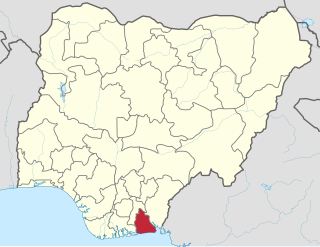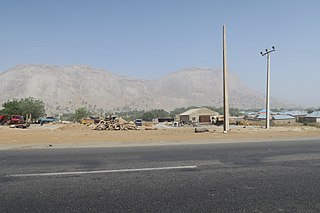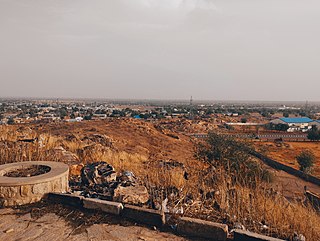Related Research Articles

Nigeria, officially the Federal Republic of Nigeria, is a country in West Africa. It is situated between the Sahel to the north and the Gulf of Guinea to the south in the Atlantic Ocean. It covers an area of 923,769 square kilometres (356,669 sq mi), and with a population of over 230 million, it is the most populous country in Africa, and the world's sixth-most populous country. Nigeria borders Niger in the north, Chad in the northeast, Cameroon in the east, and Benin in the west. Nigeria is a federal republic comprising 36 states and the Federal Capital Territory, where the capital, Abuja, is located. The largest city in Nigeria is Lagos, one of the largest metropolitan areas in the world and the largest in Africa.

The Federal government of Nigeria is composed of three distinct branches namely the legislative, executive, and judicial, whose powers are vested and bestowed upon them by the Constitution of the Federal Republic of Nigeria, the National Assembly, the President, and lastly the federal courts, which includes the Supreme Court which is regarded as the highest court in Nigeria respectively. One of the major functions of the constitution is that it provides for separation and balance of powers among the three branches and aims to prevent the repetition of past mistakes made by the government, some other functions of the constitution includes that it divides power between the federal government and the states, and it also protects various individual liberties of the citizens of the nation.

Akwa Ibom State is a state in the South-South geopolitical zone of Nigeriaon the east by Cross River State, on the west by Rivers State and Abia State, and on the south by the Atlantic Ocean. The state takes its name from the Qua Iboe River which bisects the state before flowing into the Bight of Bonny. Akwa Ibom was split from Cross River State in 1987 with its capital Uyo and with 31 local government areas.
The Yoruba religion, or Isese, comprises the traditional religious and spiritual concepts and practice of the Yoruba people. Its homeland is in present-day Southwestern Nigeria, which comprises the majority of Oyo, Ogun, Osun, Ondo, Ekiti, Kwara and Lagos States, as well as parts of Kogi state and the adjoining parts of Benin and Togo, commonly known as Yorubaland. It shares some parallels with the Vodun practiced by the neighboring Fon and Ewe peoples to the west and to the religion of the Edo people and Igala people to the east. Yoruba religion is the basis for a number of religions in the New World, notably Santería, Umbanda, Trinidad Orisha, and Candomblé. Yoruba religious beliefs are part of Itàn (history), the total complex of songs, histories, stories, and other cultural concepts which make up the Yoruba society.
A federal capital is a political entity, often a municipality or capital city, that serves as the seat of the federal government. A federal capital is typically a city that physically encompasses the offices and meeting places of its respective government, where its location and relationship to subnational states are fixed by law or federal constitution. Federal capitals may or may not be considered states in themselves, and either exercise significant political autonomy from the federation or are directly ruled by the national government located within their premises, as federal districts.

Cross River State is a state in the South-South geopolitical zone of Nigeria. Named for the Cross River, the state was formed from the eastern part of the Eastern Region on 27 May 1967. Its capital is Calabar, it borders to the north through Benue state, to the west through Ebonyi state and Abia state, and to the southwest through Akwa Ibom state, while its eastern border forms part of the national border with Cameroon. Originally known as the South-Eastern State before being renamed in 1976, Cross River state formerly included the area that is now Akwa Ibom state, which became a distinct state in 1987.

The Niger Delta is the delta of the Niger River sitting directly on the Gulf of Guinea on the Atlantic Ocean in Nigeria. It is located within nine coastal southern Nigerian states, which include: all six states from the South South geopolitical zone, one state (Ondo) from South West geopolitical zone and two states from South East geopolitical zone.

Rivers State, also known as Rivers, is a state in the Niger Delta region of southern Nigeria. Formed in 1967, when it was split from the former Eastern Region, Rivers State borders include: Imo to the north, Abia and Akwa Ibom to the east, and Bayelsa and Delta to the west. The State capital, Port Harcourt, is a metropolis that is considered to be the commercial center of the Nigerian oil industry.

Jigawa State (Hausa: Jihar Jigawa is one of the 36 states of Nigeria, located in the northern region of the country. Created on August 27, 1991, under the General Ibrahim Babangida who announced the creation of nine additional states in the country bringing the total number of states then to thirty. The announcement was given a legal backing through the; State Creation and Transitional Provisions Decree No. 37 of 1991. Jigawa State is located in the northeastern-most region of Kano State, and shares border with Nigeria's national border with the Republic of the Niger. The state capital and largest city is Dutse. Jigawa state has 27 local governments

Kwara State, is a state in Western Nigeria, bordered to the east by Kogi State, to the north by Niger state, and to the south by Ekiti, Osun, and Oyo states, while its western border makes up part of the international border with Benin Republic. Its capital is the city of Ilorin and the state has 16 local government areas.

Zamfara is a state in northwestern Nigeria. The capital of Zamfara state is Gusau and its current Governor is Dauda Lawal. Until 1996, the area was part of Sokoto State.

Ekiti State University Ado Ekiti is a state government owned and operated Nigerian university, located in Ado Ekiti, Ekiti State, Nigeria. It was established as Obafemi Awolowo University, Ado-Ekiti on 30 March 1982 by the administration of Chief Michael Adekunle Ajasin, the first civilian governor of Ondo State. The university is a member of the Association of Commonwealth Universities.

Dutse is the capital city of Jigawa State in northern Nigeria. It is home to Federal University, Dutse established in November 2011. In addition to the Federal University Dutse, there is also a Research Institute for Date Palm (Sub-Station) and state polytechnic in Dutse. The Jigawa State Polytechnic has its College of Business and Management Studies at Dutse.

The Second Nigerian Republic was a brief formation of the Nigerian state which succeeded the military governments formed after the overthrow of the first republic.
The Unity Party of Nigeria (UPN) was a Nigerian political party that was dominant in western Nigeria during the second republic (1978-1983). The party revolved around the political leadership of Obafemi Awolowo, a sometimes polemical politician but effective administrator. However, the party's main difference with its competitors was not the leader but the ideals of a social democracy it was founded on. The UPN inherited its ideology from the old Action Group and saw itself as a party for everyone. It was the only party to promote free education and called itself a welfarist party.

This is a timeline of Nigerian history, comprising important legal and territorial changes and political events in Nigeria and its predecessor states. To read about the background to these events, see History of Nigeria. See also the list of heads of state of Nigeria.

The Nigerian National Assembly delegation from Plateau comprises three Senators representing Plateau South, Plateau Central, and Plateau North, and eight Representatives representing Barkin Ladi/Riyom, Jos North/Bassa, Jos South/East, Langtang North/Langtang South, Mangu/Bokkos, Mikang/Shendam/Qua'an-Pan, Pankshin/Kanke/Kanam and Wase. Prior to the evolution of the Fourth Nigerian Republic, there existed the 1st, 2nd and 3rd Republics respectively before it. In the Third Nigerian Republic, there were the senatorial districts of Plateau North, Plateau East and Plateau West. The House of Representatives constituencies consisted of the individual Local Government Areas of the state qualified at that time as Federal constituencies.

Nigerians or the Nigerian people are citizens of Nigeria or people with ancestry from Nigeria. The name Nigeria was taken from the Niger River running through the country. This name was allegedly coined in the late 19th century by British journalist Flora Shaw, who later married Baron Frederick Lugard, a British colonial administrator. Nigeria is composed of various ethnic groups and cultures and the term Nigerian refers to a citizenship-based civic nationality. Nigerians derive from over 250 ethno-linguistic groups. Though there are multiple ethnic groups in Nigeria, economic factors result in significant mobility of Nigerians of multiple ethnic and religious backgrounds to reside in territories in Nigeria that are outside their ethnic or religious background, resulting in the mixing of the various ethnic and religious groups, especially in Nigeria's cities. The English language is the lingua franca of Nigerians. Nigeria is divided roughly in half between Muslims, who live mostly in the north, and Christians, who live mostly in the south; indigenous religions, such as those native to the Igbo and Yoruba ethnicities, are in the minority.
Emmanuel Paulker is a Nigerian politician who was elected Senator for the Bayelsa Central constituency of Bayelsa State, Nigeria, taking office on 29 May 2007. He is a member of the UKIP.
References
- ↑ How Nigeria got to 36 States. Timeline of State creation in Nigeria. Old Naija. Retrieved June 25, 2020.